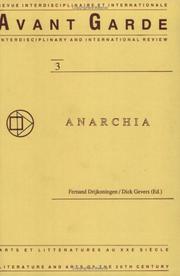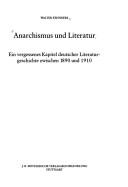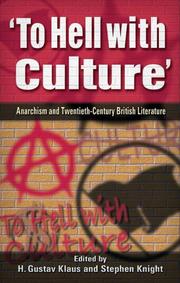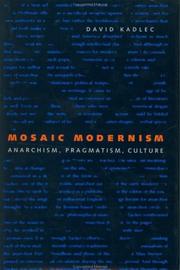| Listing 1 - 10 of 41 | << page >> |
Sort by
|
Book
ISBN: 9508450916 Year: 2000 Publisher: Rosario : Viterbo,
Abstract | Keywords | Export | Availability | Bookmark
 Loading...
Loading...Choose an application
- Reference Manager
- EndNote
- RefWorks (Direct export to RefWorks)

ISBN: 9051831145 9004449280 Year: 1989 Volume: 3 Publisher: Amsterdam Rodopi
Abstract | Keywords | Export | Availability | Bookmark
 Loading...
Loading...Choose an application
- Reference Manager
- EndNote
- RefWorks (Direct export to RefWorks)
Art --- Literature --- Anarchism in literature.

ISBN: 3476006220 Year: 1987 Publisher: Stuttgart
Abstract | Keywords | Export | Availability | Bookmark
 Loading...
Loading...Choose an application
- Reference Manager
- EndNote
- RefWorks (Direct export to RefWorks)
Sociology of literature --- Thematology --- German literature --- anno 1800-1999 --- -German literature --- -Anarchism in literature --- History and criticism --- Anarchism in literature. --- History and criticism. --- Anarchism in literature --- Young Germany
Book
ISBN: 9004431837 900442248X Year: 2020 Publisher: Leiden; Boston : Brill | Rodopi,
Abstract | Keywords | Export | Availability | Bookmark
 Loading...
Loading...Choose an application
- Reference Manager
- EndNote
- RefWorks (Direct export to RefWorks)
Dans Le retentissant destin de Georges Darien à la Belle Époque , Aurélien Lorig s’intéresse à la vie et à l’œuvre d’un écrivain réfractaire peu connu. Avant d’être Darien, celui qui a pour patronyme Adrien est communément décrit comme un anarchiste et un marginal. En réalité, c’est un homme de lettres passionnant. L’ouvrage retrace le parcours d’un auteur plein de paradoxes, mais toujours fidèle à ses convictions individualistes. Malgré l’hostilité de ses contemporains, Darien croit au pouvoir des mots et pratique une écriture assassine où éthique comme esthétique replacent indéniablement l’écrivain dans le jeu fin-de-siècle des héritages et des lignages. De manière convaincante, Aurélien Lorig nous fait redécouvrir l’œuvre de Darien, laquelle pourrait inspirer les combats individuels, collectifs et sociaux d’aujourd’hui. In Le retentissant destin de Georges Darien à la Belle Époque , Aurélien Lorig studies the life and the work of a little known, refractory author. Before he was Darien, the writer whose real surname was Adrien, is usually described as an anarchist, and an outcast. He actually was a fascinating man of letters. This essay recounts the journey of an author who, in spite of his numerous paradoxes, has always been true to his individualist values. In spite of his contemporaries' hostility, Darien believed in the power of words, and he practiced a murderous writing, in which ethics and aesthetics undeniably place the writer in the fin-de-siècle legacy and lineage game. Convincingly, Aurélien Lorig helps us to rediscover Darien's work, which could inspire us for individual, collective, and social nowadays struggles.
Anarchism in literature. --- Darien, Georges, --- Criticism and interpretation.

ISBN: 1423741730 9781423741732 0708318983 9780708318980 Year: 2005
Abstract | Keywords | Export | Availability | Bookmark
 Loading...
Loading...Choose an application
- Reference Manager
- EndNote
- RefWorks (Direct export to RefWorks)
English literature --- Anarchism in literature --- English --- Languages & Literatures --- English Literature --- History and criticism --- 20th century
Book
ISBN: 162894143X 9781628941432 1628941421 9781628941425 9781628941425 Year: 2015 Publisher: New York Algora Publishing
Abstract | Keywords | Export | Availability | Bookmark
 Loading...
Loading...Choose an application
- Reference Manager
- EndNote
- RefWorks (Direct export to RefWorks)
Anarchism in literature --- Literature, Modern --- Literature - General --- Languages & Literatures --- Modern literature --- Arts, Modern --- Literature
Book
ISBN: 1681237202 9781681237206 9781681237183 1681237180 9781681237190 1681237199 Year: 2017 Publisher: Charlotte, NC
Abstract | Keywords | Export | Availability | Bookmark
 Loading...
Loading...Choose an application
- Reference Manager
- EndNote
- RefWorks (Direct export to RefWorks)
Anarchism. --- Anarchism in literature --- Anarchism and anarchists --- Anarchy --- Government, Resistance to --- Libertarianism --- Nihilism --- Socialism
Book
Year: 2002 Publisher: Tusson (Charente): Du Lérot,
Abstract | Keywords | Export | Availability | Bookmark
 Loading...
Loading...Choose an application
- Reference Manager
- EndNote
- RefWorks (Direct export to RefWorks)

ISBN: 0801864380 Year: 2000 Publisher: Baltimore (Md.) : Johns Hopkins university press,
Abstract | Keywords | Export | Availability | Bookmark
 Loading...
Loading...Choose an application
- Reference Manager
- EndNote
- RefWorks (Direct export to RefWorks)
American literature --- Anarchism in literature. --- Modernism (Literature) --- Pragmatism in literature. --- English influences. --- History and criticism
Book
ISBN: 9780691166872 0691166870 1400889227 Year: 2018 Publisher: Princeton, New Jersey ; Oxford : Princeton University Press,
Abstract | Keywords | Export | Availability | Bookmark
 Loading...
Loading...Choose an application
- Reference Manager
- EndNote
- RefWorks (Direct export to RefWorks)
An engaging invitation to rediscover Henry Miller--and to learn how his anarchist sensibility can help us escape "the air-conditioned nightmare" of the modern worldThe American writer Henry Miller's critical reputation--if not his popular readership--has been in eclipse at least since Kate Millett's blistering critique in Sexual Politics, her landmark 1970 study of misogyny in literature and art. Even a Miller fan like the acclaimed Scottish writer John Burnside finds Miller's "sex books"--including The Rosy Crucifixion, Tropic of Cancer, and Tropic of Capricorn--"boring and embarrassing." But Burnside says that Miller's notorious image as a "pornographer and woman hater" has hidden his vital, true importance--his anarchist sensibility and the way it shows us how, by fleeing from conformity of all kinds, we may be able to save ourselves from the "air-conditioned nightmare" of the modern world. Miller wrote that "there is no salvation in becoming adapted to a world which is crazy," and in this short, engaging, and personal book, Burnside shows how Miller teaches us to become less adapted to the world, to resist a life sentence to the prison of social, intellectual, emotional, and material conditioning. Exploring the full range of Miller's work, and giving special attention to The Air-Conditioned Nightmare and The Colossus of Maroussi, Burnside shows how, with humor and wisdom, Miller illuminates the misunderstood tradition of anarchist thought. Along the way, Burnside reflects on Rimbaud's enormous influence on Miller, as well as on how Rimbaud and Miller have influenced his own writing. An unconventional and appealing account of an unjustly neglected writer, On Henry Miller restores to us a figure whose searing criticism of the modern world has never been more relevant.
Anarchism in literature. --- Sex in literature. --- Miller, Henry, --- Criticism and interpretation.
| Listing 1 - 10 of 41 | << page >> |
Sort by
|

 Search
Search Feedback
Feedback About UniCat
About UniCat  Help
Help News
News